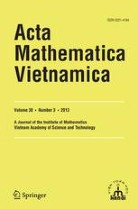
Acta Mathematica Vietnamica
- Volume 50
- Volume 49
- Volume 48
- Volume 47
- Volume 46
- Volume 45
- Volume 44
- Volume 43
- Volume 42
- Volume 41
- Volume 40
- Volume 39
- Volume 38
- Volume 37
- Volume 36
- Volume 35
- Volume 34
- Volume 33
- Volume 32
- Volume 31
- Volume 30
- Volume 29
- Volume 28
- Volume 27
- Volume 26
- Volume 25
- Volume 24
- Volume 23
- Volume 22
- Volume 21
- Volume 20
- Volume 19
- Volume 18
- Volume 17
- Volume 16
- Volume 15
- Volume 14
- Volume 13
- Volume 12
- Volume 11
- Volume 10
- Volume 9
- Volume 8
- Volume 7
- Volume 6
- Volume 5
- Volume 4
- Volume 3
- Volume 2
- Volume 1
Maximal Generating Degrees of Powers of Homogeneous Ideals
Le Tuan Hoa
Abstract
The degree excess function $\epsilon(I,n)$ is the difference between the maximal generating degree $d(I^n)$ of the n-th power of a homogeneous ideal $I$ of a polynomial ring and $p(I)n$, where $p(I)$ is the leading coefficient of the asymptotically linear function $d(I^n)$. It is shown that any non-increasing numerical function can be realized as a degree excess function, and there is a monomial ideal I whose $\epsilon(I,n)$ has exactly a given number of local maxima. In the case of monomial ideals, an upper bound on $\epsilon(I,n)$ is provided. As an application, it is shown that in the worst case, the so-called stability index of the Castelnuovo-Mumford regularity of a monomial ideal $$ must be at least an exponential function of the number of variables.


